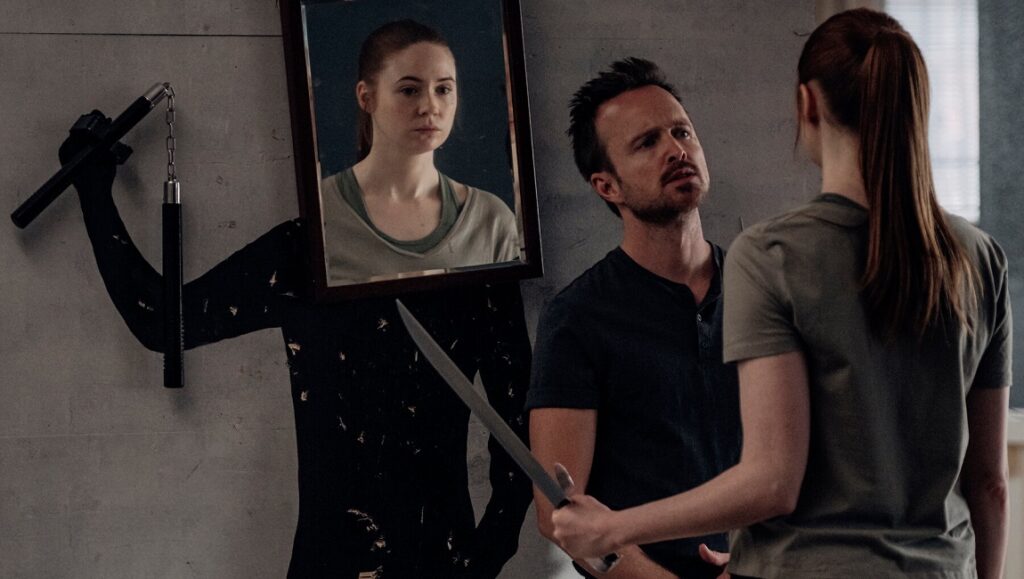Dual is delightfully off-kilter and funny enough to keep the viewer’s attention, but is undermined by its failures of internal logic and a general impression of ephemerality.
With his latest movie Dual, Riley Stearns (The Art of Self-Defense) takes a story that seems like it ought to be a slick studio blockbuster and brings it to the level of a deadpan indie, replete with a streak of absurdist humor. The approach works well enough in the moment, but the ultimate results strain both the viewer’s attention and the premise’s intrinsic logic. It’s apparently the near future, although it seems indistinguishable from the present. Karen Gillan is Sarah, a depressed, aimless young woman who learns she’s dying from some terminal illness. In what’s presented as an ordinary act designed to minimize the suffering of those left behind, Sarah enters the “replacement” program; when she dies, her clone, named “Sarah’s Double,” will resume the rest of her life. Bummer news for Sarah though: she ends up not dying from said terminal illness, and so when Sarah’s Double wants to also remain alive, the law dictates that Sarah must fight her clone to the death in single combat.
Sarah’s kind of an idler herself, so matters don’t improve when Sarah’s Double starts taking over her life with a bit more ambition, eventually landing not just the apartment but the boyfriend, job, etc. — she basically leads a boosted version of the same existence. With Dual‘s duel looming, Sarah enlists the help of a self-defense trainer, Trent (Aaron Paul). It’s in this middle chunk that Gillan’s particular and total deadpan pays off. Stearns has clearly directed her to assume a flat affect and robotic dialogue delivery that keeps steering the silliness back into a sort of grounded drabness, subtly sad. Even while the film is not really productively about much more than some standard-issue questions of identity and destiny, and the comedy seems sort of endlessly non-sequitur-ish, the tone and performances are delightfully off-kilter. It’s also here that Stearns has taken some direct influence from Yorgos Lanthimos and company: the premise is obviously cousin to that of The Lobster, and elsewhere Sarah’s relationship with Trent involves some dance routine shtick that can’t help but remind of both Alps and Dogtooth.
Unfortunately, it’s all leading to a rather perfunctory twist, even if you don’t think this can only end one of two ways. Worse, the conclusion doesn’t even make sense within the logic presented to us by the film. Without spoiling things, it’s safe to say that the actions taken by Sarah’s Double seem entirely unnecessary, and bleeds the concept of some of its appeal. Still, even while Dual ends up in a sort of stasis that feels a bit pointless, it’s welcomingly brisk and funny enough to be engrossing. Just don’t expect too much more than that.


Comments are closed.